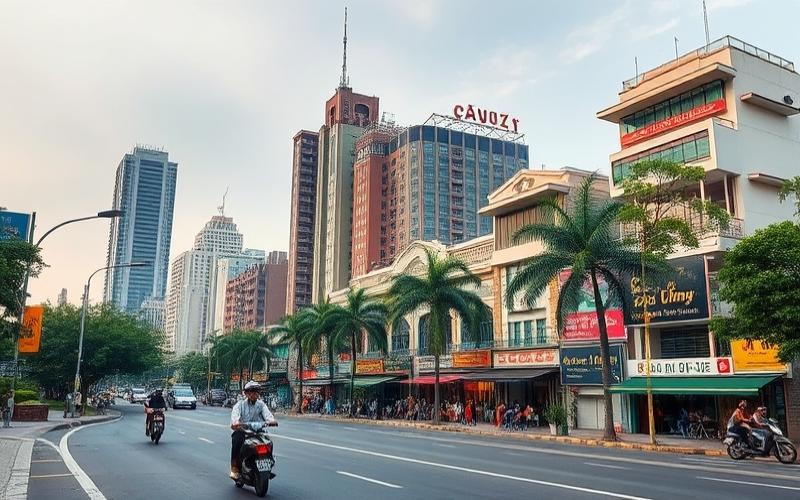
 Published on and written by Cyril Jarnias
Published on and written by Cyril Jarnias
Vietnam’s Real Estate Market: How to Choose a Trustworthy Agency
Vietnam’s booming real estate market is attracting an increasing number of international investors, but navigating through numerous agencies can be challenging. Choosing the right agency is essential to successfully operate in this dynamic and constantly evolving environment.
In this article, we highlight five characteristic signs of a trustworthy and competent agency, specifically within the Vietnamese context, that will help you optimize your real estate investments. Discover how to identify exemplary practices in transparency, local knowledge, and customer service to ensure you make the right choice.
Good to Know:
The Vietnamese real estate market is experiencing strong growth, but it’s crucial to work with competent professionals to secure your investments.
How to Identify a Reputable Agency in Vietnam
Required Certifications and Licenses
To operate legally, a real estate agency in Vietnam must hold a business license issued by the government, along with real estate practice certificates for its agents. These certificates are issued by the Department of Construction in the province or centrally-run city where the agency is registered. Starting July 1, 2025, the organization of exams and issuance of certificates are decentralized to local construction services, in accordance with Decree 144/2025/ND-CP.
To verify the authenticity of these documents:
- Ask to see the business license and agents’ practice certificates.
- Verify their validity with the local construction department (online or in person).
- Ensure the agency has at least two agents holding valid brokerage certificates.
Warning: Operating without these certificates exposes the agency to administrative fines and is a red flag.
Signs of Professionalism
A reputable agency can be recognized by several signs:
- Clear and detailed contracts: All transaction terms are explicitly specified without ambiguity.
- Transparency about fees: Commissions, additional costs, and payment terms are communicated upfront.
- Responsive customer service: Availability, quick responses to inquiries, personalized follow-up before and after signing.
Reputation Verification
To assess an agency’s reliability, it’s important to:
- Read client reviews on specialized platforms or forums dedicated to Vietnamese real estate.
- Ask for personal recommendations from expatriates or investors who have used their services.
- Check if the agency has received industry awards or mentions in professional media.
Comprehensive Range of Services
The most reputable agencies typically offer:
- Administrative support: Handling paperwork (file submission, certificate acquisition, etc.)
- Legal assistance: Verifying property titles, securing transactions, helping with contract drafting and signing.
- Tax and financial advice: Guidance on local taxation, estimation of additional costs.
| Service Offered | Brief Description |
| Administrative Support | Handling procedures with local authorities |
| Legal Assistance | Legal verification of documents and property titles |
| Tax and Financial Advice | Help understanding taxes and fees related to the transaction |
Membership in Professional Associations
Membership in a recognized professional association (such as the Vietnam Real Estate Association – VNREA) serves as a guarantee of seriousness and ethical commitment. This membership implies adherence to a code of conduct and participation in ongoing training.
Key Takeaways
- Always verify licenses and certificates with the relevant authorities.
- Prefer agencies that demonstrate transparency and high service standards.
- Rely on the agency’s reputation, recommendations, and professional involvement in the sector.
Good to Know:
To identify a reputable real estate agency in Vietnam, it’s essential to verify that it possesses the necessary certifications and licenses required by law to operate legally, which can be authenticated with the Ministry of Construction. Professionalism is reflected in clear contracts, fee transparency, and responsive customer service. Consulting client reviews or seeking recommendations is crucial for verifying the agency’s reputation, as well as checking if it has been recognized by industry bodies. Opt for an agency offering a comprehensive range of services, including support with administrative and legal procedures. Finally, membership in recognized professional associations, such as the Vietnam Real Estate Association, often indicates ethical commitment and rigorous professional practices.
Red Flags to Avoid with Real Estate Agents
Practices to Avoid with Real Estate Agents in Vietnam:
- Withholding Crucial Information
Some agents intentionally omit important details about the property (structural issues, associated debts, reached foreign quotas) or sale conditions. This practice harms the client’s decision-making and constitutes an ethical breach. - Lack of Transparency in Communication and Price Negotiation
A reliable agent should clearly explain the buying or leasing process, justify each cost or additional fee, and unambiguously present the property’s actual price. Vagueness around fees often hides an intent to unduly increase the commission at the client’s expense. - Excessive Pressure to Close Quickly
Some agents use tactics to push for urgent signing (e.g., “this property will be gone tomorrow,” “there are already multiple offers”), without giving the client necessary time to think or verify information. This pressure is a major red flag. - Unprofessional Behavior
- Repeated delays for appointments.
- Absence from scheduled viewings.
- Failure to honor written or verbal commitments.
| Key Points | Concrete Signs to Watch For |
|---|---|
| Withholding Information | Refusal to provide certain documents |
| Lack of Transparency | Vague explanations about fees |
| Pressure | Unusual insistence to sign quickly |
| Unprofessionalism | Frequent delays, missing appointments |
Essential Verification Before Any Transaction:
- Systematically request professional references from previous clients who bought/sold with this agent.
- Consult independent online reviews (specialized websites, local forums).
- Ensure the agent has proven experience in the local Vietnamese market along with all necessary accreditations.
Also Watch Out For:
Excessive Commissions or Fees Without Clear Justification
- Fees significantly higher than local standards should raise concerns. Always request a detailed quote and compare with multiple agencies if needed.
- An excessively high commission may mask an attempt to financially exploit the client rather than providing a genuinely premium service.
Good to Know:
When searching for a real estate agent in Vietnam, be wary of unethical practices, such as withholding crucial information about properties or sale conditions. Transparency is essential, particularly in communication and price negotiation; any lack in this area should alert you. Avoid agents who exert excessive pressure to close quickly, as it’s crucial to take time to properly consider the transaction. Be attentive to unprofessional behaviors, such as lack of punctuality or failure to honor commitments. It’s also prudent to verify the agent’s references and experience to guarantee their expertise and reputation in the Vietnamese market. Finally, remain vigilant towards agencies proposing abnormally high commissions or fees without justified explanation.
Understanding Real Estate Agency Agreements in Vietnam
Key Elements of a Real Estate Agency Agreement in Vietnam
An agency agreement in Vietnamese real estate formalizes the relationship between a principal (client, often the owner) and a real estate agency or agent. It governs the search, sale, or lease of a property and protects the interests of both parties.
Main Constituent Elements:
- Contract Subject: Specifies the property concerned (address, characteristics), the intended operation (sale, lease), and the services expected from the agency.
- Agreement Duration: Typically contractually fixed (often 3 to 6 months for a sale). In Vietnam, practices vary by region – in major cities like Hanoi or Ho Chi Minh City, the duration is often more regulated to avoid disputes.
- Remuneration Terms: The commission paid to the agency is specified as a percentage of the sale price or as a fixed fee. Common example: commission between 1% and 3% of the final amount upon a successful transaction. Payment occurs only upon success (“success fee”).
- Legal Obligations of the Parties
- Principal: Provide all necessary documents about the property (official “pink book” title), guarantee the property is free of other claims, and respect financial commitments.
- Real Estate Agency:
- Loyally inform the client about the local market
- Verify the legal validity of the title (“pink book”)
- Draft all contracts in compliance with local laws (in Vietnamese or bilingual)
- Correctly register each transaction with local authorities
Common Special Clauses in Vietnam
- Exclusivity: The agreement can be exclusive or non-exclusive; in the latter case, multiple agencies can operate simultaneously.
- Penalty Clause: Provides for compensation in case of faulty non-performance by either party.
- Suspensive Conditions: For example, prior obtaining of specific administrative approvals for certain properties owned by foreigners.
| Element | Common Practice in Vietnam | Local Particularities |
|---|---|---|
| Duration | 3 to 6 months | Flexible outside major cities |
| Commission | 1% to 3% | Sometimes up to 5% outside urban areas |
| Exclusivity | Frequent but not systematic | Subject to negotiation |
Fair Protection & Legal Security
A precisely drafted contract protects:
- Clients against any concealment of the property’s actual condition through the agency’s obligation of full disclosure;
- The agency against any abusive withdrawal through clear penalty clauses;
- Both parties through a legal framework allowing recourse before a notary and local land administration.
Concrete example:
In nearly 80% of transactions conducted through recognized agencies in major Vietnamese metropolises over the past five years, no major disputes were reported when the contract adhered to these standards (statistic based on local sector reports).
A balanced contract therefore guarantees transparency and security for both foreign and local investors.
Checklist – Essential Points Before Signing:
- Exhaustive verification of the title (“pink book”)
- Clear definition of agency missions/limits
- Complete detail of commissions/additional fees
- Certified translation if necessary
- Penalty clause adapted to local stakes
Any breach exposes both principal and agency to civil or even criminal penalties depending on severity.
Good to Know:
In Vietnam, a real estate agency agreement must include essential elements such as party identification, the mandate’s subject, its duration which is generally three to six months, and termination conditions. The real estate agency is legally required to work in the principal’s interest, meaning the client, and provide accurate information about the property. Regarding remuneration, the commission rate, often between 2% and 5% of the sale price, must be clearly stipulated to avoid ambiguity. Special clauses may also include confidentiality obligations or restrictions on subcontracting. A well-drafted contract protects the principal by offering clear legal recourse in case of dispute, while regulating the agency’s practices to ensure transaction transparency and ethics.
Tips for Choosing a Reliable Real Estate Partner
Essential Criteria for Identifying a Reliable Real Estate Partner in Vietnam:
- Background and Reputation Check
- Prefer agencies or agents recommended by trusted third parties or through word-of-mouth.
- Consult the agency’s online presence (website, client reviews, social media).
- Evaluate their time in the market and experience in the sector.
- Verify if the agency is affiliated with recognized professional organizations.
Tips for Verifying References and Professional Accreditations
- Systematically ask to see official accreditations (professional license, membership in a local real estate chamber).
- Require presentation of recent client references with verifiable contact details.
- Contact several former clients directly to obtain objective feedback on service quality.
| Criterion | Why It’s Important | How to Verify |
|---|---|---|
| Recommendations | Proven reliability | Online reviews, personal network |
| Online Presence | Transparency and accessibility | Official website, social media |
| Professional Accreditations | Legal and ethical guarantee | Official documents, organizations |
| Client References | Actual service quality | Direct testimonials |
Transparency in Business Practices
- Ensure all fees (agency fees, commissions) are clearly explained from the start.
- Request a written contract detailing each service and its associated cost.
Key points regarding transparency:
- All fees must be unambiguously listed before signing
- A written quote should be provided to avoid misunderstandings
- The agent must answer financial questions precisely
Assessment of Local Market Knowledge
- The agent should demonstrate a fine understanding of local specifics (average prices by neighborhood/city, recent market trends).
- They should be able to present several properties matching the desired profile and explain their objective advantages/disadvantages.
Recommendations:
- Ask specific questions about different neighborhoods or market segments
- Request a comparative analysis between several options
Ability to Understand and Respond to Specific Needs
- A good agent takes time to listen to your particular requirements: exact budget, desired property type (residential/commercial), intended stay/investment duration…
- They adapt their proposals accordingly rather than imposing their own catalog
Tips:
- Provide a clear list of your priorities from the beginning
- Evaluate whether the contact person tailors their research or remains generic
Availability and Responsiveness
To guarantee continuous support:
- Prefer an agent easily reachable via phone/WhatsApp/email; test their response speed during initial exchanges
- Ensure they offer regular follow-up throughout the process until legal completion
Practical Checklist for Choosing Your Real Estate Partner in Vietnam:
- Verify personal recommendations/reliable public reviews
- Check official licenses/accreditations
- Demand total transparency on all costs
- Test local expertise through concrete questions
- Observe active listening & adaptation to individual needs
- Measure availability/responsiveness during initial contacts
A reliable real estate partner combines recognized local experience, contractual transparency, sharp on-the-ground knowledge, and personalized attention throughout your project
Good to Know:
To choose a reliable real estate partner in Vietnam, it’s crucial to verify the agency’s background and reputation by requesting references from former clients and ensuring the company is accredited by professional organizations. Make sure the agency practices total transparency in communicating fees and charges, which is essential to avoid unpleasant financial surprises. Evaluating the agent’s local market knowledge is also paramount; a good agent should be able to respond to your specific needs by providing accurate information about neighborhoods, price trends, and investment opportunities. Availability and responsiveness are also important criteria to guarantee close support throughout the transaction process; a partner who is reachable and responds quickly is often a good sign of commitment to the client.
Disclaimer: The information provided on this website is for informational purposes only and does not constitute financial, legal, or professional advice. We encourage you to consult qualified experts before making any investment, real estate, or expatriation decisions. Although we strive to maintain up-to-date and accurate information, we do not guarantee the completeness, accuracy, or timeliness of the proposed content. As investment and expatriation involve risks, we disclaim any liability for potential losses or damages arising from the use of this site. Your use of this site confirms your acceptance of these terms and your understanding of the associated risks.











































